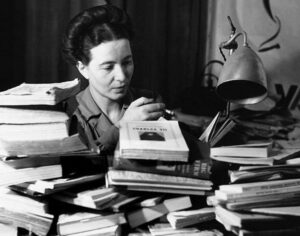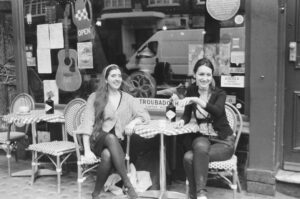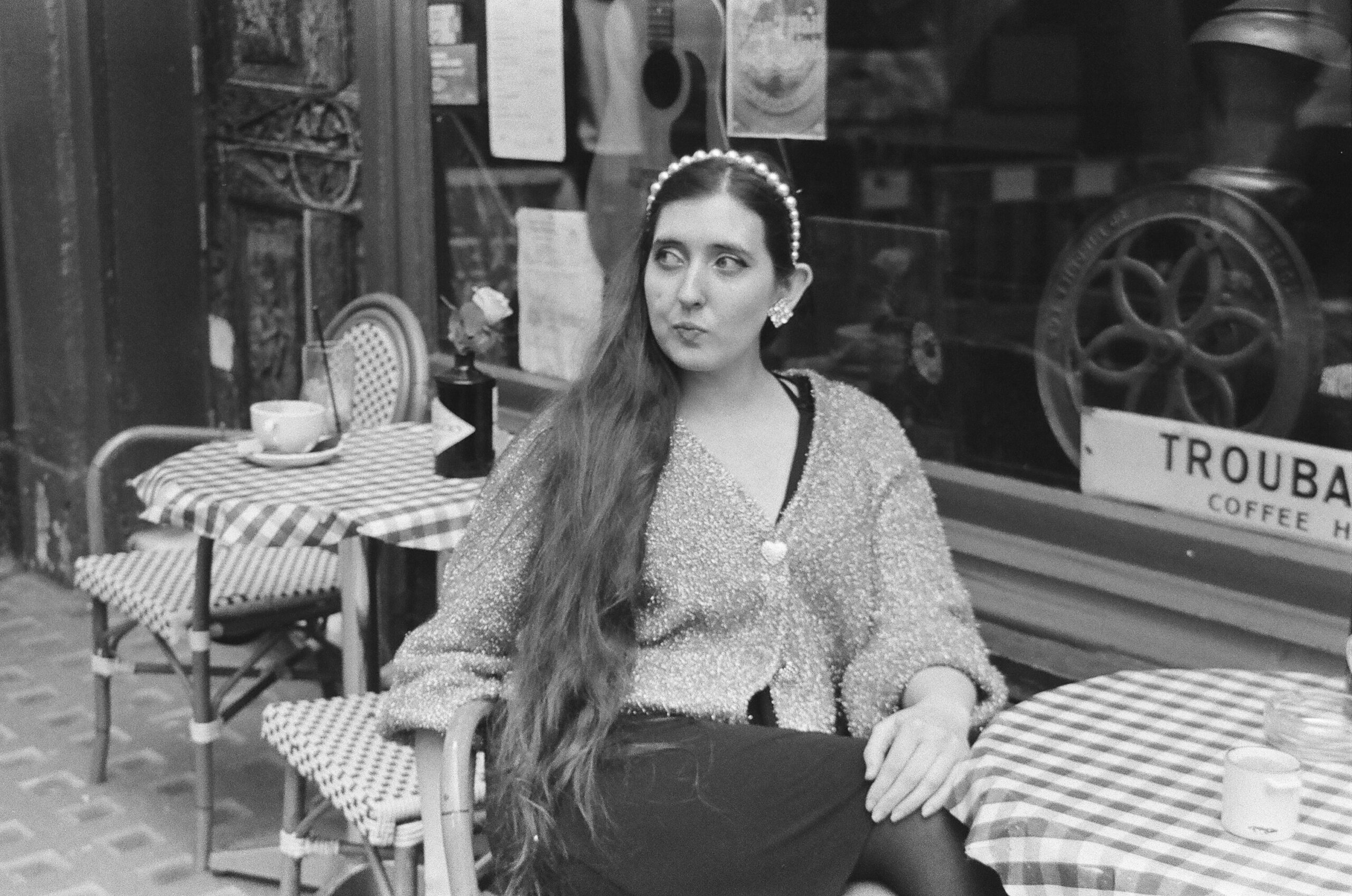Playwright Grace Joy Howarth in conversation with Olivia Hurton
It is a still April afternoon on the Old Brompton Road. I sit at a table outside the Troubadour and wait for playwright Grace Joy Howarth, who greets me with effervescence and warmth. A waterfall of long chestnut hair flows behind her, and her arms are laden with bags containing props and costumes. In a few hours it will be press night for The Inseparables at Finborough Theatre, a play based on feminist philosopher Simone de Beauvoir’s 1954 novella about female friendship, which over the past year Howarth has been busily adapting for the stage.
While she is no stranger to penning original scripts – her work has made it to the stage and the screen – The Inseparables marks a move in Howarth’s career towards literary adaptation. It has been a process that she describes as a “big learning curve”, where she enjoyed “having the framework [of a given story] to work within” yet also found the space to “bring my own voice into it […] [and] explore the text through a twenty-first-century woman’s lens”. The original was, of course, written by Simone de Beauvoir, a monumental literary figure that Howarth admits first seemed intimidating due to her intellectual stature and ideological influence. “In my mind she had this very holy state as a feminist icon […] she seemed so far away like Lenin and Marx.” But this project has changed her perspective. Through The Inseparables, which draws on the emotional turbulence and passions of Beauvoir’s girlhood for its material, Howarth came to see “a more human side to her”; “I suppose that the pedestal has been knocked down a little bit,” she adds.
Howarth is a natural storyteller. There’s something fairylike in her light, glittering voice that puts one in the mind of folk tales and enchantments. That we should meet at the Troubadour is fitting, for Howarth’s journey to playwriting was by way of an early love of song. At London’s Institute of Contemporary Music Performance she read for a degree in songwriting and quickly realised a desire to “write songs for musicals and even write a whole musical”. This opened the door to the world of theatre. “I started doing scratch pieces for various theatres around London,” she tells me, and it became obvious that “it was a natural progression to go down the playwriting route.” The writers that inspire her remain lushly lyrical: Anaïs Mitchell, who wrote Hadestown, for her “beautiful music”, and Tennessee Williams, who is “just sublime at writing dialogue”.
So how did adapting The Inseparables come about? “It was actually through Anastasia Bruce, the director […] [who] loved it [when it was first published], and it was in the back of her mind that she wanted to adapt it for the stage somehow.” In fact, Bruce and Howarth have become regular collaborators over the past five years, ever since they met virtually on a project during the days of lockdown. “We’re our own little set of inseparables, to be honest,” Howarth quips; “we always have the same taste.” What followed was a less than subtle reading suggestion from Bruce. “She was like ‘Read this little novel […] it’s only short and won’t take long to get through. See what you think.’ Hint, hint.” Howarth recalls sitting in the library and breathlessly racing through Beauvoir’s prose in one sitting. She was struck by its theatrical potential but had one misgiving: would the publishers ever grant the rights? Happily, Beauvoir’s estate was open to the idea, and Howarth wasted no time in setting to work.
However, before this theatrical venture, Beauvoir’s The Inseparables had already lived many lives. Written in a frenzy of yearning for lost love and youth in 1954, publication in 2020 came late. It had been sniffed at by Beauvoir’s long-term lover and intellectual sparring partner Jean-Paul Sartre, who told her that it lacked interest. What could Beauvoir do but stuff the sheaves into her writing desk and try again, weaving all the colours of young life she wished to convey into Memoirs of a Dutiful Daughter (1958)? In short, it was a false start, a sapling stifled before it had been given a proper trial.

This too was the fate of the novella’s vivacious subject, Andrée, based on Beauvoir’s childhood best friend Elizabeth ‘Zaza’ Lacoin. The roman-à-clef recounts Sylvie (Beauvoir’s avatar) and Andrée’s intense relationship, which ended tragically when she died from viral encephalitis at just twenty-one. The friendship fundamentally shaped the girls as they progressed from nine-year-old convent pupils into early adulthood. It was this “phenomenal arc” that captivated Howarth, the trajectory from “a very innocent childhood friendship that grows as they grow as women”. But this brings troubles with it. Conflicts arise between constricting ideals and competing notions of how to live a fulfilling life. “Andrée has this path set out for her that she has to follow, and Sylvie is desperately trying to give her freedom, give her happiness,” Howarth explains.
Indeed, coming from different social classes in a post-war world, Sylvie and Andrée – just like Simone and Elizabeth – interrogate each other’s views about marriage, women’s roles and religious faith. Sylvie represents the déclassé, whose new and ambiguous status in society extends liberty to women from the ashes of the First World War. With an impecunious father, Sylvie has been brought up to expect to enter the world of work and achieve economic independence. Contrastingly, Andrée hails from the haute bourgeois. Her deeply Catholic family uphold social rituals and abide by repressive conservative conventions that are merely a repetition of those practised by the solemn-looking ancestors that peer down at her from family paintings at her Béthary home.
Friendship serves an important function in bridging such ideological divergences and opening up perspectives. Unsurprisingly, it’s a theme that Howarth keeps returning to in her work. Referring to Blood on Your Hands, her play which centres on a male bond of friendship and was staged at the Southwark Playhouse last year, she explains, “The world can be a very grim place at times […] [it’s important to recognise] how precious friendship can be to lift people and save people in a way.” Similarly, in The Inseparables, Sylvie plays an important role in encouraging Andrée to live authentically, acknowledging changing opinions and emotional development as a sign of growth. “There’s a line in the play – and the novel as well,” Howarth points out, “where Sylvie says, ‘You know yourself better now.’ I think that is just so lovely. It shows there is that brighter stage ahead where you step into yourself, you know yourself more, and it all fits into place a bit more then.” It is a lifelong journey of becoming which, as Howarth says, is particularly difficult when you are young because “trying to shake those [harmful] outside voices off is such a challenge”.

Fortunately, Howarth embraces challenges. As we chat, she lets slip that writing hasn’t been her only role within the production. She looks around furtively and lowers her voice: “A real secret is I actually designed the costumes as well.” Admittedly, it’s been a manic schedule for her, scurrying between rehearsals and evening stints at the sewing machine. The result: frothy pastel petticoated frocks, petal white lace dresses, and knitted twin sets befitting Mademoiselle Chanel herself. It’s evident that Howarth, who adores research and rummaging in vintage shops, derives much creative pleasure from the process. “I love historical costume, the silhouettes, everything it says about the person and the sort of standing of who you are in the world.” A further layer of meaning has been added to the clothes through the use of colour in Howarth’s designs, which, she explains, are thoughtfully deployed in “more heightened moments to present the inner worlds and the vibrancy [of the characters].”
If The Inseparables is a treat of sensual pleasures, an account of love and life experienced for the first time and thus intensified, critics have been at loggerheads over the nature of the passion shared by Sylvie and Andrée. For Paul B. Preciado the novella is a ‘tragic lesbian love story’, a claim that Beauvoir’s literary executor and adopted daughter, Sylvie Le Bon de Beauvoir, vehemently refutes. Translator Lauren Elkin also takes the view that there’s something more than platonic between them. “I think it’s her first romantic love even if she doesn’t realise it as such,” Howarth opines; “Simone de Beauvoir had relationships with women.” The thunderous passion they express, however, is at all times underwritten by a deep and rare intellectual affinity. Sylvie describes her infatuation as ‘admiration’. Forthright, audacious and fizzing with ideas, Andrée embodies what Sylvie wishes to be. But The Inseparables also pushes against the idea of romance as the highest form of love. “Friendship does seem to get demoted a little bit behind romantic relationships,” Howarth says. The novella makes a case against this fallacious hierarchy, and instead exemplifies Beauvoir’s conception of authentic love, an affection grounded in respect, independence, and freedom.
Against the strong winds that buffet them, in The Inseparables Sylvie and Andrée come to realise that individual identity has to be continuously fought for and defended. Simone de Beauvoir would dedicate her life to raising the consciousnesses of other women through her writings, calling out the hostile and oppressive social forces that rendered them victims of the system. In The Inseparables she wrote a story of becoming, a reminder that love and friendship are not only the source of great pleasure and pain but a formative school through which we come to know the world. Grace Joy Howarth, whose ambition is to create dramatic works “which have meaningful heart to them […] and speak to people as a force for goodness”, hopes to continue this intellectual legacy for tomorrow’s women.
The Inseparables runs at the Finborough Theatre until 10th May 2025.

